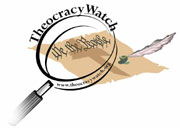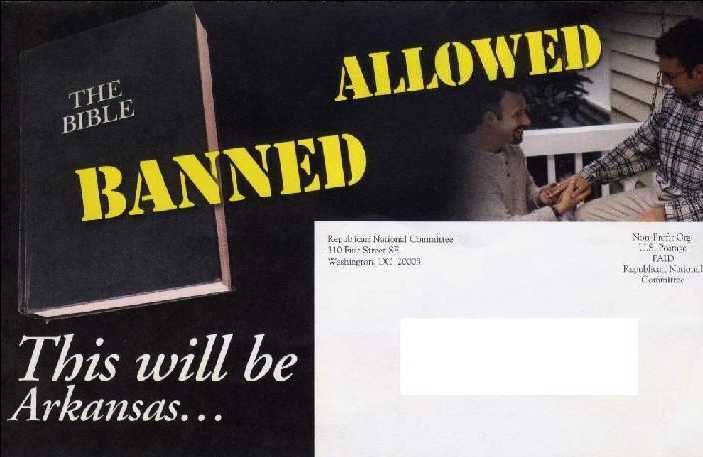
The Rise of the Religious Right
in the Republican Party
|
|||||||
|
|||||||
The Bush-Cheney '04 Campaign: Christian Coalition Is in the White HouseWill the Real Republican Party Please Stand UpJim Crow and the GOP Preaching to the Choir Ralph Reed is At It Again Bush lobbies the Vatican Objections from Religious Leaders Legislation from The House One can feel the hand of Ralph Reed in the Bush-Cheny '04 campaign. Reed was hired to chair the southeastern region, but his reach seems to be national. He's working through the Churches much the way he did for Christian Coalition. This page will link to articles about the tactics of Bush-Cheney campaign and Republicans in Congress as they strive to strengthen the ability of churches to participate in partisan politics without risking their tax-exempt status. Will the Real Republican Party Please Stand Up Beliefnet reports that Christian nation activist, David Barton, is a paid consultant with the RNC:
For more on David Barton: "Who Is David Barton, And Why Is He Saying Such Awful Things About Separation Of Church And State?" This is a long, but very important article from Ron Suskind, New York Times, October 17, 2004, Without A Doubt.
"The Rev. Jerry Falwell said yesterday that evangelical Christians, after nearly 25 years of increasing political activism, now control the Republican Party and the fate of President Bush in the November election." (From the San Diego Union-Tribune, September 25, 2004) Now on DVD, The Passion of the Bush, Frank Rich, New York Times, October 3, 2004.
Bishop William Boyd Grove, a Methodist Bishop who served as the Bishop of The West Virginia Conference and is now retired, wrote: RELIGION AND THE ELECTION, A Caution Against Blasphemy. Follow the Money, The Nation, November 1, 2004, shows how the Bush administration has used prosecutions, audits and obscenity investigations against organizations that don't share its ideology while sending millions of dollars to organizations of the Christian Right. September 10, 2004, Keeper of the Faith? God's Will, According to the Bush Administration, from Counterpunch:
September 5, 2004, South Carolina's The State.com wrote:
September 4, 2004, the LA Times, Christian Conservatives Leave Convention in Great Spirits:
Writing the Platform Two articles from the New York Times, August 31: Party Centrists Find Places on Stage but Not on Agenda, New York Times, and Social Conservatives Wield Influence on Platform. The 2004 Republican Party Platform was developed in secrecy, behind closed doors, much the way the Bush White House and Republican-dominated Congress has operated the government these past three and a half years. From the New York Times, August 27, 2004:
Conservatives Grumble on Planks Reflecting Bush Agenda, New York Times, August 26, 2004, reveals tension between social conservatives and moderate pragmatists within Republican Party. The Republican Make-over "We still have moderates in our party,'' said Representative DeLay, a Texas conservative. "We have so many moderates that that is all that is speaking at our national convention.'' G.O.P. Centrists to Speak at Convention, but Will They Be Heard? (New York Times, August 23, 2004) August 30, 2004, a Repubulican explains the Republican make-over: Bush Agenda Is AWOL by Michael Cudahy. The genuine leaders of the Republican Part The Council for National Policy has operated in secrecy since 1981. Its membership consists of hard-core religious leaders such as Pat Robertson, Jerry Falwell, James Kennedy and the late Rousas Rushdoony. Ralph Reed claims to have learned his craft there at the feet of the Reverend Tim LaHaye who was co-founder of the organzation. Other members include policitcal operatives, and big financiers of the Religious Right. At their three-times-a- year meetings they plan strategies. Because of their secrecy, the media has paid very little attention to the organization. It is therefore remarkable and encouraging that the New York Times has reported on them this year, calling the Council "Club of the Most Powerful." (New York Times, August 28, 2004)
From Buzzflash, August 17, Conventional Facades: Why the Republicans Have to Hide their Agenda
Jim Crow's New Party, Julian Bond, August 26, 2004:
The Long Shadow of Jim Crow , a special report from People for the American Way Foundation, gives many specific examples of the many ways minority voters are disenfranchised. Groups Say GOP Moves to Stifle Vote , Washington Post , August 26, 2004:
"A Chill in Florida" by New York Times columnist Bob Herbert describes the Republican strategy of disenfranchising black voters in Florida. (August 23, 2004) Indian Health Agency Barred New-Voter Drive from the Washington Post, October 6, 2004, on efforts to ban voter registration on government property of a constituency important to the Democrats. Black Pastors Backing Bush Are Rare, but Not Alone, from the New York Times, October 5, 2004. From the New York Times, "On the Road, Bush Fields Softballs From the Faithful," August 16, 2004, reports that while a series of forums the candidate is holding appear to be spontaneous, the audience is carefully selected:
From the LA Times, August 15, 2004, "The president aims to appeal to mainstream voters while keeping his religious base happy." From the Washington Post, August 15, 2004:
From the AP, August 12, 2004, Top Evangelicals Still Await GOP Invite Better-known Religious Right leaders such as Falwell and Robertson have not been invited to the Republican National Convention, possibly to make the party appear more moderate than it really is. The real movers and shakers of the party, however, will be attending, not as religious leaders, but as party insiders.
The New York Times, September 23, 2004:
The New York Times, August 9, 2004:
President Bush Lobbies the Vatican, Reported from Church and State, July/August, 2004, Critical Mass:
The article points out that only five of 178 American Bishops are joining the effort to use communion as a campaign tool by denying communion to candidates who don't support Church doctrine. In addition forty-eight Catholic members of Congress signed a letter charging that bishops who deny communion on political grounds are "miring the Church in partisan politics." Group of Bishops Using Influence to Oppose Kerry, New York Times, October 12, 2004 September 8, Washington Post on the Vatican and Catholics voting:
Susan Gibbs, spokesperson for Washington's Cardinal Theodore E. McCarrick, head of a commission of U.S. bishops on Catholics in political life said, "the church speaks on issues, not on individuals. The church never tells someone who to vote for." Arkansas Church's Partisan Politicking Needs Irs Investigation, Says Americans United. The Green Bay News, July 19, 2004:
New York Times Editorial, July 14, 2004: Onward G.O.P. Soldiers
The Guardian UK, Bush Poll Campaign Courts Religious Right, July 3, 2004: "Evangelical 'mega-churches' may hold the key to the White House:"
New York Times, Party Appeal to Churches for Help Raises Doubts, David Kirkpatrick, July 2, 2004 Washington Post, Churchgoers Get Direction From Bush Campaign By Alan Cooperman, July 1, 2004 Americans United for Separation of Church and State, Bush Campaign Targets Churches For Election Outreach The Seattle Times, Bible Belt churches putting Bush in more than prayers By Geneive Abdo, Chicago Tribune, June 30, 2004 Americans United for Separation of Church and State, Philadelphia Church That Endorsed Bush Gets $1 Million 'Faith-Based' Grant, June 23, 2004 New York Times, Bush Allies Till Fertile Soil, Among Baptists, for Votes By David Kirkpatrick, June 18, 2004 Republicans woo Jewish and Catholic voters, New York Times, September 3, 2004: Republicans Try to Expand Appeal to Religious Voters Objections from Religious Leaders From Yahoo News, September 1, 2004: Jewish Groups Irked by Cross on Republican Podium. From the Washington Post, August 18, 2004:
From The Jewish Week, August 9, 2004:
Here are the Interfaith Alliance's, Do's and Don'ts for candidates listed in "Running for Office in a Multi-Faith Nation." Rabbi David Saperstein, Director of the Religious Action Center of Reform Judaism issued the a statement in response to a campaign instruction sheet sent out to religious volunteers by the Bush-Cheney reelection team containing a list of campaign activities to be performed in churches. "Efforts aimed at transforming houses of worship into political campaign offices stink to high heaven," says Rabbi Saperstein.New York Times, A Bill Eases Vote Curb on Churches By David Kirkpatrick, June 8, 2004 From the AP, June 7, 2004 Bill Allows Mixing of Religion, Politics. Bush '04 Re-election Campaign is openly taking down the wall of separation between Church and State. Associated Press, Bill Allows Mixing of Religion, Politics, By LARA JAKES JORDAN, June 4, 2004
BodyContent Last updated: 14-Jul-2004 |
|||||||
| home | contact | about us | |||||||
 This flyer was not sent out by some extremist
This flyer was not sent out by some extremist